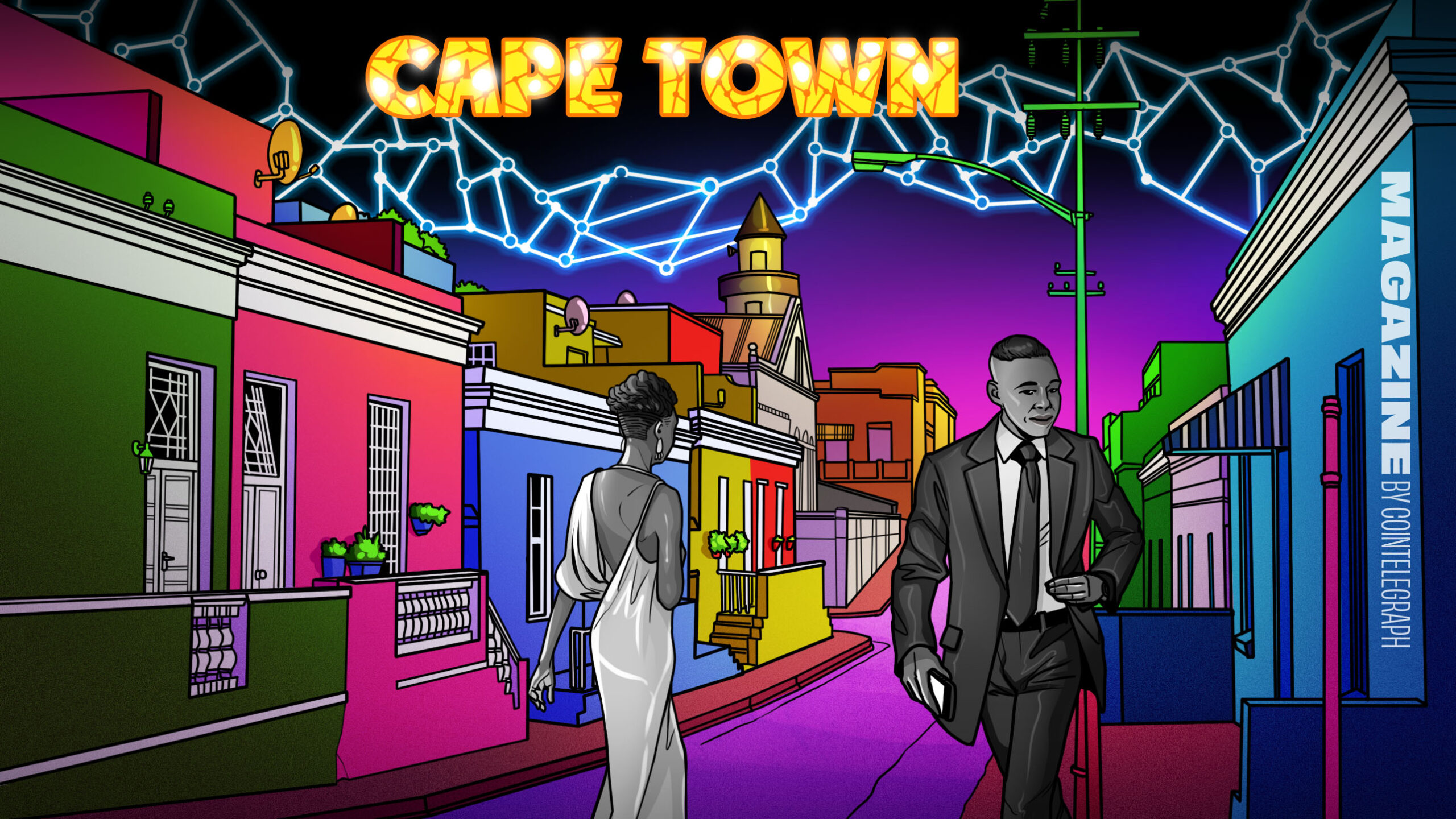City: Cape TownCountry: South AfricaPopulation: 4.77 millionEstablished: 1652Languages: Afrikaans, Xhosa, English
Jump to: Cape Town’s crypto culture, Crypto projects and companies, Crypto financial infrastructure, Where to spend crypto in Cape Town, Crypto controversies, Blockchain education, Notable crypto people from Cape Town.
Nestled at the southern tip of Africa, Cape Town’s silhouette is defined by the monumental Table Mountain. The second-most populous city in South Africa, the “Mother City” is consistently featured as a top vacation destination, offering a combination of nature, beaches, history, culture and recreation.
The city rests at a place of undeniable geographic significance, being the spot where ships circling the tip of Africa change directions from south to east or vice versa. It was here in 1652 that the Dutch East India Company established Cape Colony to supply Dutch ships sailing for East Africa, India and the Far East, making it the first European settlement in modern South Africa.
Cape Town was captured by British forces in 1795, and it was returned to the Dutch in 1803, only to be recaptured in 1806 as part of the Napoleonic Wars, with a later treaty giving permanent control to the British.
Western Cape became a province of the British-established Union of South Africa in 1910. The city existed under a policy of racial apartheid from 1950 to 1990, with neighborhoods divided according to race and with many political prisoners, including Nelson Mandela, who was held on the nearby Robben Island. Voting rights for all races were eventually restored, and a new constitution was adopted in the early 1990s.
Long seen as a gateway to Southern Africa, Cape Town’s airport is the fifth-busiest in Africa. The surrounding valleys boast world-class wineries.
Cape Town’s crypto culture
Cape Town can be considered a crypto hub in Africa, with a number of conferences scheduled annually. These include Adopting Bitcoin in January and Crypto Fest Cryptopia, which takes place in November. The first ETH CapeTown, a hack-a-thon, took place in 2019.
Here's a list of upcoming crypto events in Cape Town! 🇿🇦 Add yours to the thread too if I've missed any
— Devon Krantz (@Devkrz) January 20, 2023
The oceanside city is often compared and contrasted with Johannesburg — or “Joburg,” as the locals say — a commercial hub where “people have a commercial desire versus a desire to create mutually beneficial relationships, which is more characteristic of Cape Town.”

ApeCoin also chose the city for its first African event. Partnering with the music festival Ultra on March 1, 2024. Nelson Mandela’s grandson, Kweku Mandela, attended the event as a guest of honor, featuring performances by Steve Aoki and Skrillex. ApeCoin DAO’s Special Council member and ApeChain co-author, Herve Larren, who helped bring together the event, says he spends several months of the year in the city, in large part “because of its crypto-friendly digital nomad crowd,” adding that it is a favorite wintering spot of industry VCs.
Crypto meetups in the city are “very informal in nature, with business events often turning into social ones,” explains Greg van der Spuy, co-founder and CEO of smart contract firm Dark Fusion Technology. The firm’s penthouse office features a rooftop barbecue area for hosting gatherings.
While acknowledging that “there are still untrusted actors,” he argues that connections form very naturally here, contrasting it to environments such as California, where he says people tend to only open up their networks if they can benefit directly.

From Magazine’s interactions in the city, it appears as if many real friendships could form rather quickly, with people often interested in the actual human behind the business or product.
The #WomeninCrypto event in Cape Town, 🇿🇦South Africa was a success.
The team had a great time networking and discussing all things Web3 and blockchain with enthusiastic women who are passionate about the crypto industry! pic.twitter.com/YNqLgupNJG
— Binance Africa (@BinanceAfrica) March 30, 2023
Cape Town’s crypto projects and companies
Crypto companies have sprouted throughout the city, spanning a wide variety of use cases, from localized energy-sharing to globally competitive blockchain infrastructure companies.
When it comes to DeFi, NeoNomad operates a variety of apps on Solana and has developed ZarCoin, a stablecoin pegged to the South African Rand, which they advertise as fully backed and compliant with local regulations. ZARP is another comparable stablecoin, meaning that South Africans have options when it comes to using Web3 without giving in to USD hegemony. For those looking to launch a project, Block Markets Africa and RainFin offer design, listing and legal structuring services in order to bring tokens into compliance.
Wildcards.world is an NFT trading platform dedicated to images of endangered animals, with over $200,000 raised to date for conservation efforts. The Sun Exchange installs solar panels in what it calls some of the sunniest places on Earth, paying investors with returns from electricity sales in cryptocurrency. FoodPrint uses blockchain tracking systems to offer supply chain management services, especially for small farmers.
On the podcast side, Crypto Banter is known throughout the world and contributes a South African flair to the global crypto conversation.
The sector is becoming increasingly respectable. South Africa’s Financial Sector Conduct Authoritythis week approved 59 operating licenses for crypto businesses, with another 262 license applications still in progress.
Read also
Features
Bitcoin gets physical: Art or digital heresy?
Features
Real AI use cases in crypto, No. 2: AIs can run DAOs
Cape Town’s crypto financial infrastructure
The city boasts three major crypto exchanges: OVEX, Luno and Circle-backed VALR. According to van der Spuy, South African exchanges often offer significant arbitrage opportunities to similar exchanges elsewhere, with differences in crypto rates being “0.5%–3.6% at any given point.” He notes that on the previous day of our interview, Bitcoin on South African exchanges was 2.5% more expensive than on comparable exchanges abroad.

This is caused by “very strict regulatory controls” around international money transfers enacted “to prevent capital flight out of the Rand system.” Despite this, he says liquidity has improved as more competition has entered the market.
As a country with many migrants from across Africa, access to traditional banking is not a given for everyone. Using examples from his own circle, van der Spuy explains how non-citizens sending money to their home countries rely on gray-market money-transfer services, which can cost up to 30% in fees — a huge cut to an already humble $100 monthly remittance. But cryptocurrencies, particularly stablecoins, are beginning to provide an alternative — though the availability of an off-ramp, such as an exchange at the money’s destination, often proves a challenge.
“It’s very hard as a non-South African citizen to get a bank account,” says van der Spuy.

Where can I spend crypto?
A number of businesses accept cryptocurrency locally, most of these having begun doing so within the past year.
Notable is Pick-n-Pay, where more than 2,000 stores allow purchases of groceries, airtime and even payment of utility bills for BTC via partner CryptoQR.
Cape Coffee Beans offers coffee flavors from across the continent.
Several e-commerce sites active across the country also accept crypto — these include fashion store RunwaySale Takealot.com, as well as The Team Merchant and Custom Candies. Nevada Furniture, an Ikea importer, also makes the list.

Crypto controversies in Cape Town
Like many cities with a sizable crypto community, Cape Town has seen its fair share of scammers and hackers. According to a 2021 report by Chainalysis, the city was the site of one of the biggest Bitcoin scams when Mirror Trading International (MTI) promised 0.5% in daily returns to depositors, raising $588 million from nearly half a million wallets before imploding.
Many Cape Town clients were caught up in the 2021 Africrypt controversy. The Joburg exchange, run by brothers Ameer and Raees Cajee, reportedly sent users notices regarding missing funds, asking them not to make any reports to the police. According to media reports, the brothers then disappeared with $3.6 billion in cryptocurrency.

Unlike in Dubai or Switzerland’s Crypto Valley, crypto travelers are advised to keep their shiny watches and hard wallets tucked away, as the country’s large wealth disparities contribute to higher crime rates. Electric fences and razor wire surrounding family homes are a common sight. As such, a high degree of caution — especially when it comes to devices with crypto access — is necessary.
Read also
Features
The FBI’s takedown of Virgil Griffith for breaking sanctions, firsthand
Features
Crypto Pepes: What does the frog meme?
Blockchain education in Cape Town
A two-day Bitcoin and Cryptocurrency course is offered several times per year by The Knowledge Academy, while the Blockchain Academy offers a range of in-person and online courses ranging from “Trading for Beginners” to one on “Legal and Regulatory Implications.”

For those with more time to explore, the University of Cape Town offers a six-week course called “Blockchain and Digital Currency: The Future of Money.” In 2019, the university partnered with Registree in order to add student records to a blockchain database for easy validation and storage.
Paxful, one of the world’s largest peer-to-peer bitcoin marketplaces, and Startup Grind South Africa, the side-hustler and entrepreneur whisperers, have partnered to offer a free workshop at the University of Cape Town on how you can take advantage of the bitcoin economy.💎🔥 pic.twitter.com/xKUCoM3t1B
— UCT Entrepreneurs' Society (@SocietyUct) May 14, 2019
Notable crypto people from Cape Town
Fantom co-founder Andre Cronje; Monero maintainer Riccardo Spagni — aka Fluffypony; Luno exchange co-founder Marcus Swanepoel; country manager at Luno exchange Christo de Wit; CEO of Dark Energy Technology Greg van der Spuy; OVEX exchange CEO Jonathan Ovadia; general manager of Southern and Francophone Africa at Binance Hannes Wessels; founder of Fynbos Adrian Hope-Bailie; CV VC managing director for Africa Gideon Greaves.
Subscribe
The most engaging reads in blockchain. Delivered once a
week.


Elias Ahonen
Elias Ahonen is a Finnish-Canadian author based in Dubai, who bought his first Bitcoin in 2013 and has since worked around the world operating a small blockchain consultancy. His book Blockland tells the story of the industry. He holds an master's degree in international and comparative law and wrote his thesis on NFT and metaverse regulation.




